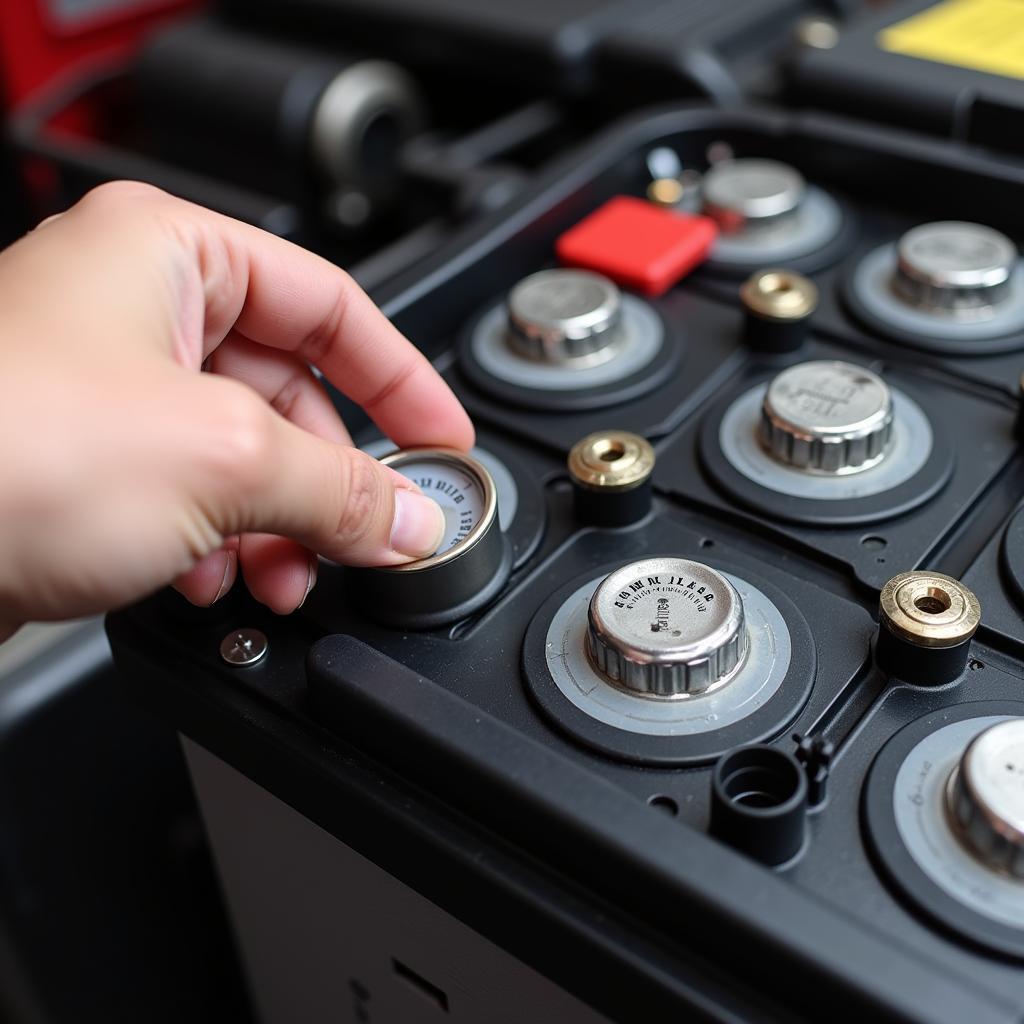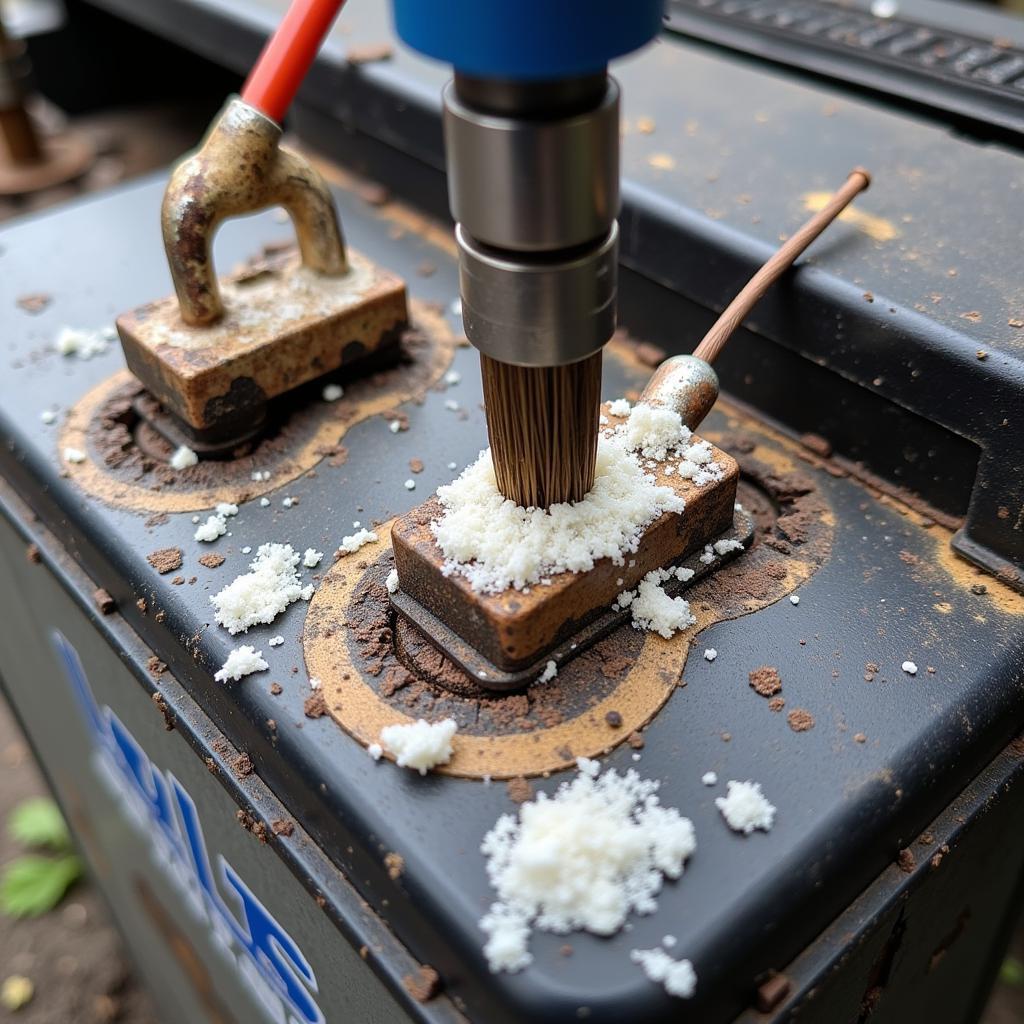A car battery is the heart of your vehicle’s electrical system. It powers everything from the starter motor to the radio. When your battery starts to fail, it can cause a range of problems, some obvious and some less so. Knowing the symptoms of a battery going bad can save you time, money, and frustration.
Similar to a car will not start but battery is good, other starting issues could be related to a failing battery. Let’s explore these symptoms to help you diagnose potential battery issues.
Common Signs Your Car Battery is Failing
Several key indicators can point to a dying battery. Recognizing these symptoms early can prevent you from being stranded.
Slow Engine Crank
One of the most common symptoms of a battery going bad is a slow engine crank. When you turn the key, the engine cranks slowly and sluggishly, taking longer than usual to start. This indicates the battery is struggling to provide enough power to the starter motor. What causes a slow crank? A weak battery is often the culprit.
Dim Headlights
Dim headlights, especially when the engine is idling, are another telltale sign. A failing battery struggles to maintain a consistent voltage, resulting in weaker headlight illumination.
Clicking Sound When Turning the Key
If you hear a rapid clicking sound when you turn the key, it usually means the battery doesn’t have enough power to engage the starter solenoid. This is a classic symptom of a dead or dying battery.
Electrical Malfunctions
A failing battery can also cause erratic behavior in other electrical components. You might experience flickering interior lights, malfunctioning power windows, or issues with the radio. These problems often occur intermittently before becoming more persistent.
Check Engine Light
While a check engine light can be triggered by various issues, a failing battery is one possible cause. The car’s computer monitors the battery’s voltage, and if it detects a problem, it can illuminate the check engine light.
Low Battery Fluid Level
Traditional car batteries have fluid levels that can be checked. If the fluid level is low, it can affect the battery’s performance and lifespan. Low fluid levels can be caused by overcharging or extreme temperatures.
 Checking Car Battery Fluid Level
Checking Car Battery Fluid Level
Swollen Battery Case
A swollen or bloated battery case is a serious sign of internal damage. This can be caused by overcharging or excessive heat. A swollen battery is a safety hazard and should be replaced immediately. If you see your battery in this condition, avoid touching it and consult a professional.
Old Age
Car batteries have a limited lifespan, typically lasting between three and five years. As a battery ages, its internal components degrade, reducing its ability to hold a charge. If your battery is nearing the end of its expected lifespan, it’s a good idea to have it tested.
What Causes a Car Battery to Go Bad?
Several factors can contribute to a failing car battery. Extreme temperatures, both hot and cold, can shorten a battery’s life. Overcharging or leaving lights on can also drain the battery and cause damage. Additionally, corrosion on the battery terminals can interfere with the electrical connection. Similar to maintaining your battery for key fob 2015 nissan altima, proper car battery care can extend its life.
Expert Insight: John Smith, Automotive Electrical Engineer
“Modern vehicles rely heavily on their electrical systems. A failing battery can trigger a cascade of problems, from starting issues to electronic malfunctions. Regular battery testing and maintenance are essential for preventing these headaches.”
 Corroded Car Battery Terminals
Corroded Car Battery Terminals
Conclusion
Recognizing the symptoms of a battery going bad can save you from being stranded. If you experience any of the signs mentioned above, have your battery tested by a qualified mechanic. Regular maintenance, including cleaning the terminals and checking the fluid level, can help extend your battery’s life and keep your vehicle running smoothly. Remember, addressing battery issues promptly can prevent more extensive and costly repairs down the road.
FAQ
- How long do car batteries typically last? Most car batteries last between three and five years.
- Can I jump-start a car with a bad battery? Yes, you can jump-start a car with a bad battery, but it’s a temporary solution. The battery will likely need to be replaced.
- How can I test my car battery? You can test your car battery using a multimeter or by taking it to a mechanic or auto parts store for testing.
- What should I do if my battery case is swollen? Do not touch a swollen battery. It is a safety hazard. Consult a professional for replacement.
- Can extreme temperatures affect my battery? Yes, both extreme heat and cold can shorten a battery’s lifespan.
- How often should I have my battery tested? It’s a good idea to have your battery tested annually, especially if it’s more than three years old.
- Can a bad battery cause my car to stall? Yes, a failing battery can sometimes cause a car to stall, particularly if the alternator is also having issues. Similar to a nissan altima 2015 key fob battery, the car battery is critical for the vehicle’s overall performance.
Expert Insight: Jane Doe, Certified Automotive Technician
“Don’t ignore the warning signs of a failing battery. A seemingly minor issue can quickly escalate into a major inconvenience. Proactive maintenance is always the best approach.”
Expert Insight: David Lee, Automotive Service Manager
“Many drivers underestimate the importance of a healthy battery. It’s more than just starting the car; it powers the entire electrical system. Regular checks and timely replacements are crucial for reliable vehicle operation. Don’t wait for a breakdown; be proactive with your battery maintenance.” This is especially true when dealing with complex electrical systems, similar to the situation with battery for nissan altima key fob 2015.
